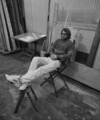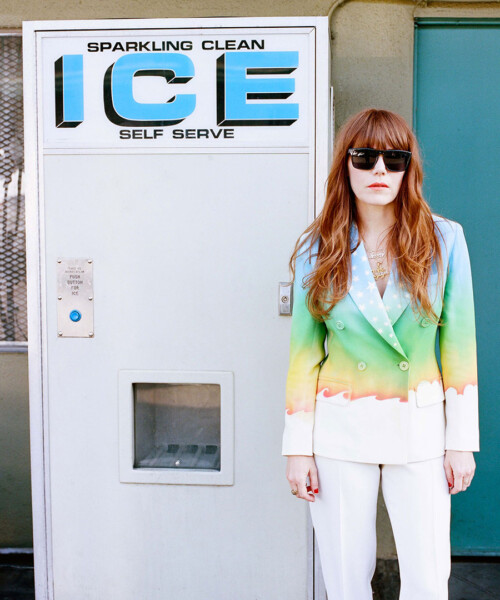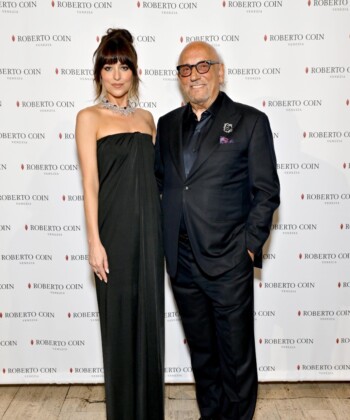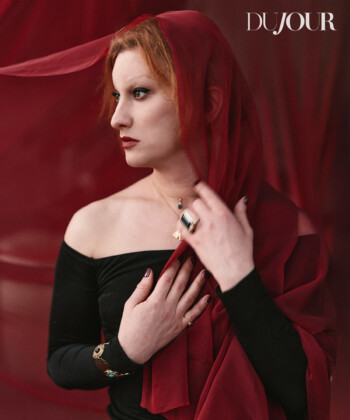The Voyager is an apt title for Jenny Lewis’s latest album. The record, out July 29, certainly involved a journey. Lewis worked on the songs for years, all the while wading through a series of harrowing happenings, including chronic insomnia and the death of her father.
Here, DuJour talks to the former Rilo Kiley front woman (and Troop Beverly Hills actress) about songwriting, working with Beck and how boxing inspires her music.
This album was a long time in the making. How did it come to be?
In the past, throughout my musical career, I have put out a record almost every two years without any break in between, and before that I was a working child actor from the time that I was three years old. So I hadn’t really taken a break in my life creatively since I was a toddler. The last record I put out was in 2008. For a woman in her mid-thirties, that’s kind of a crucial period, and I just couldn’t quite get it together with these tunes. Still, I’m constantly writing, I’m constantly discarding songs and ideas. And sometimes you have to write 20 shitty songs to get to a mediocre one.
So how did you know when these songs were the right ones to release?
Just because you have a song that you think is finished and it’s good doesn’t mean that you can capture the essence of it on tape or on a computer. So, with this record, I had these songs that were lying around for a little while and I kept trying these versions of them, but the versions seemed lifeless to me. They seemed weak somehow, so that’s what really took me so long. Amidst a very tumultuous period of my life, I was just like, these songs sound like shit. It took a couple years to finally get to the versions that I would be happy with.

Jenny Lewis. Photograph by Autumn de Wilde
You collaborated with a number of great musicians, including Beck and Ryan Adams. How is collaborating helpful for you?
I come from an independent rock background where you do everything yourself, and I think that you can feel like a failure if you ask for help—but that’s not the case. Sometimes you need help and you need to learn from the people around you. I was just at a loss with a lot of this material, so I reached out to Ryan Adams and Beck, two people who I really respect as artists, and I hoped that they could spirit guide me through the process. And I was open; I was in a spot of my life where I really wanted help. I was fortunate enough to be in a position where I could reach out to them and they weren’t like, ‘Fuck off, freak,’ but you have to be in a place where you’re ready to take correction. If Beck is telling me to do something, I better do it.
You’ve been vocal about dealing with intense insomnia. Do you write music when you can’t sleep?
When I couldn’t sleep, I wasn’t pleased. It was devastating to not sleep for two years. It almost took me out, but in surviving, I just occupied my mind with my lyrics. I also watched a lot of boxing matches, but the need to finish the [lyrics] was what kept me sane while I was awake for all of those nights.
What was it about boxing matches that worked for you?
I became really interested in the backstory, the struggle of the boxers, and I started researching where these guys came from. Watching something that had a beginning, middle and end was very comforting. And I don’t even like sports; I’ve never liked sports. I had a boyfriend and we broke up because he watched ESPN every night before we went to sleep. Now I love watching two grown men beat the shit out of each other for 12 full rounds—it’s truly bizarre.
Which songs on the album are you happiest with?
“Just One Of The Guys” was a tough one to grapple with because the very first moment that I wrote that song, it had a really wonderful feeling. I was holding on so closely to this first moment of inception and I sent that version to Beck and he really responded to it. He was able to understand what was good about that version that I recorded alone at home, but also he understood the potential of the song. It’s the first song I wrote for this record, so I feel like that was the one I gave up on so many times. To have it be the first single from this record feels good.
What’s the story behind the title? What does The Voyager mean to you?
It’s really just the journey of anyone. Not being able to sleep, then finally getting back to sleep. My father passed away while I was making this record, and I thought a lot about him while I was recording these songs. The journey is about his life—and then off into the cosmos he went. It just felt really universal and it felt like it summed up every aspect of the record.
Where do you think your own voyage is going to take you next? Is it going to be another six years before you release another record?
God, I hope not. That sounds like a nightmare. I’m just on to the next song. That’s all I can do—go just one song at a time, off into paradise.
Main image photographed by Autumn de Wilde
MORE:
Getting to Know Lou Doillon
DJ Cassidy’s Guide to New York City
A Hot Debut for Musician Lo Fang











































